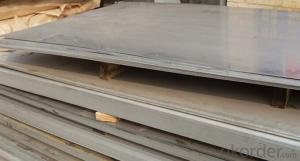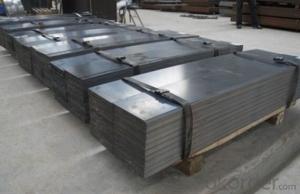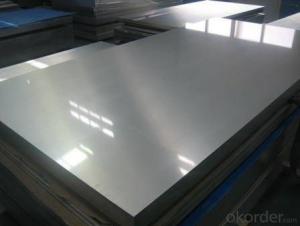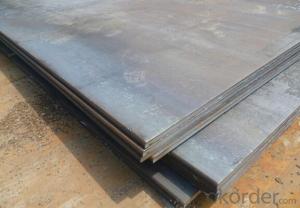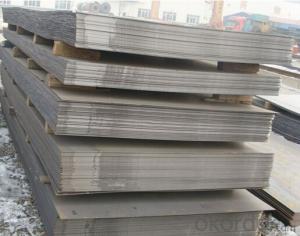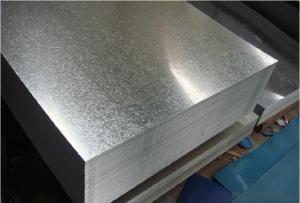Hot Rolled Carbon Steel Plate_Sheet with High Quality
- Loading Port:
- Tianjin
- Payment Terms:
- TT OR LC
- Min Order Qty:
- 3 m.t.
- Supply Capability:
- 10000 m.t./month
OKorder Service Pledge
OKorder Financial Service
You Might Also Like
Item specifice
Hot Rolled Carbon Steel Plate_Sheet High Quality
Standard | Steel Grade |
EN10025 | S235JR,S235J0,S235J2 |
DIN 17100 DIN 17102 | St33,St37-2,Ust37-2,RSt37-2,St37-3 StE255,WstE255,TstE255,EstE255 |
ASTM | A36/A36M A36 A283/A283M A283 Grade A,A283 Grade B, A283 Grade C,A283 Grade D A573/A573M A573 Grade 58,Grade 65,Grade 70 |
GB/T700 | Q235A,Q235B,Q235C,Q235D,Q235E |
JIS G3106 | SS330,SS400,SS490,SS540,SM400A,SM400B,SM400C |
Hot Rolled Carbon Steel Plate_Sheet High Quality
Product Name | Steel Grade | Thickness | Width | Application |
(mm) | (M) | |||
General structural steel | Q195,Q215A-Q,235A/B/C/D , | 1.9~25.4mm | 0.7~2 | Applied for |
Q275A/B/C/D, | normal construction | |||
SS330SS400SPHT1/2/3 | ||||
Q235CQ235D. | ||||
A36 | ||||
Low Carbon steel | SPCCSPHCSt12SAE1008 | 1.9~25.4mm | 0.7~2 | Applied for cold rolling |
SPHDSPCDKSt12St13 | 1.9~25.4mm | 0.7~2 | or cold forming | |
SPHESPCESt14 IF3 BH340 | 1.9~25.4mm | 0.7~2 | ||
Carbon constructional | 08-45#08Al15 AlS 20C S35C S45C | 1.9~25.4mm | 0.7~2 | After being machined |
Quality steel | K08AlZ06-10AlP | and hot treated to used | ||
as mechanical component | ||||
Low-alloy | SM490ASM490YA15Mn | 1.9~25.4mm | 0.7~2 | Applied for normal |
Constructional steel | Q345A/B/C/D/E | 1.9~25.4mm | 0.7~2 | construction |
Hot Rolled Steel | Q235 and customed. | 2.0mm~ 8.0mm | 0.9 | |
CNBM Introduction of the Hot Rolled Carbon Steel Plate_Sheet Supplier
CNBM International Corporation is the most import and export platform of CNBM group(China National Building Material Group Corporation) ,which is a state-owned enterprise, ranked in 270th of Fortune Global 500 in 2015.
With its advantages, CNBM International are mainly concentrate on Cement, Glass, Iron and Steel, Ceramics industries and devotes herself for supplying high quality series of refractories as well as technical consultancies and logistics solution.
After-sale service |
|
Advantages
|
|
Packaging & Delivery of the Hot Rolled Carbon Steel Plate_Sheet
Packaging Detail | Sea worthy packing /as per customer's packing instruction |
Delivery Detail | 15 ~ 40 days after receiving the deposit |
Products
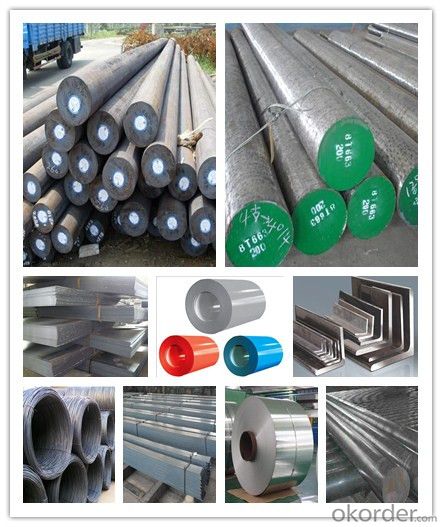
FAQ:
Are you a trading company or manufacturer? | Manufacturer |
What’s the MOQ? | 3 metric ton |
What’s your delivery time? | 15-35 days after downpayment received |
Do you Accept OEM service? | Yes |
what’s your delivery terms? | FOB/CFR/CIF |
What's the Payment Terms? | 30% as deposit,70% before shipment by T/T |
Western Union acceptable for small amount. | |
L/C acceptable for large amount. | |
Scrow ,Paybal,Alipay are also ok | |
Why choose us? | Chose happens because of quality, then price, We can give you both. Additionally, we can also offer professional products inquiry, products knowledge train (for agents), smooth goods delivery, excellent customer solution proposals. |
What's your available port of Shipment? | Main Port, China |
What’s your featured services? | Our service formula: good quality+ good price+ good service=customer's trust
|
Where are your Market? | Covering more than 160 countries in the world |
- Q:What are the different tempering techniques used for special steel?
- There are several tempering techniques used for special steel, including air tempering, oil tempering, water tempering, and salt bath tempering. Each technique involves heating the steel to a specific temperature and then cooling it at a controlled rate to achieve desired hardness, strength, and other mechanical properties.
- Q:What is the role of cobalt in special steel?
- Due to its unique properties and characteristics, cobalt plays a crucial role in special steel. It serves as a significant alloying element in the production of high-performance steel alloys, particularly those used in demanding applications where strength, hardness, and heat resistance are vital. Cobalt's primary function in special steel is to enhance its overall strength and toughness. By forming a solid solution with iron, cobalt creates a fine-grained microstructure that improves the mechanical properties of the steel. This results in increased hardness, wear resistance, and the ability to withstand high temperatures and harsh environments. Moreover, cobalt improves the steel's resistance to corrosion and oxidation, making it suitable for extreme conditions in industries like aerospace, oil and gas, and automotive. Additionally, it enhances the steel's magnetic properties, making it valuable in electrical and electronic devices. Another essential role of cobalt in special steel is its ability to facilitate the formation of stable carbides. The addition of cobalt aids in the precipitation and dispersion of carbides, contributing to the steel's high-temperature strength and excellent retention of hardness at elevated temperatures. Furthermore, cobalt assists in refining the grain structure of the steel, resulting in improved machinability and surface finish. It also allows for better control over the hardenability of the steel, determining its capacity for heat treatment and achieving desired hardness levels. To summarize, cobalt plays a multifaceted and indispensable role in special steel. It enhances the steel's strength, hardness, and toughness, improves its resistance to corrosion and oxidation, and enables it to withstand high temperatures. Cobalt also aids in refining the microstructure of the steel, enhancing machinability and allowing precise control over its hardenability.
- Q:How does special steel contribute to product innovation?
- Special steel contributes to product innovation in several ways. Firstly, special steel offers enhanced mechanical properties such as high strength, hardness, and wear resistance. This allows designers and engineers to create innovative products that can withstand higher stresses, operate in extreme conditions, and have improved longevity. For example, special steel is commonly used in the aerospace industry to manufacture lightweight yet strong components that increase fuel efficiency and improve overall aircraft performance. Additionally, special steel can be tailored to have specific characteristics such as corrosion resistance, heat resistance, or magnetic properties. This enables the development of innovative products that can operate in challenging environments, such as marine structures, power plants, or electronic devices. For instance, special stainless steel alloys are extensively used in the medical field to produce implants and surgical instruments that are biocompatible, durable, and resistant to harsh sterilization processes. Furthermore, special steel can be manufactured with precise dimensions and tolerances, allowing for intricate and complex designs. This promotes product innovation by enabling the creation of intricate components, such as gears, bearings, or turbine blades, that require high precision and reliability. These advanced designs can improve the efficiency, performance, and overall functionality of various products, ranging from automotive engines to wind turbines. Moreover, the versatility of special steel enables it to be combined with other materials, such as polymers or composites, to create hybrid products with unique properties. This opens up possibilities for innovation in various industries, including automotive, construction, and consumer electronics. For example, special steel-reinforced concrete structures can be more robust and durable, while special steel-reinforced polymers can improve the strength and impact resistance of lightweight components. In conclusion, special steel contributes to product innovation by providing enhanced mechanical properties, tailored characteristics, precise dimensions, and the ability to be combined with other materials. These capabilities empower designers and engineers to create innovative products that have improved performance, durability, and functionality, leading to advancements in various industries.
- Q:What is the maximum temperature that special steel can withstand?
- The maximum temperature that special steel can endure relies on the particular steel type employed. Special steels are engineered to possess improved qualities, including heightened resistance to heat, enabling them to endure higher temperatures in comparison to standard steels. To illustrate, certain special steels, like heat-resistant stainless steels, can withstand temperatures of approximately 1200 degrees Celsius (2200 degrees Fahrenheit). These steels are frequently utilized in scenarios where high temperatures are encountered, such as in furnaces, boilers, and exhaust systems. Different types of special steels, such as tool steels or high-speed steels, may have varying limits on their maximum temperature. These steels are commonly employed in cutting tools, molds, and machining applications, where they must maintain their hardness and strength at elevated temperatures. It should be noted that the maximum temperature that special steel can endure is also influenced by factors such as the duration of exposure to high temperature, the specific composition of the alloy, and any additional processes of heat treatment applied. Therefore, it is vital to refer to the manufacturer's specifications or seek professional advice to obtain accurate information regarding the maximum temperature limit for a specific type of special steel.
- Q:What are the cutting tools used for machining special steel?
- The cutting tools commonly used for machining special steel include carbide inserts, high-speed steel (HSS) drills and end mills, ceramic inserts, and diamond-coated tools. These tools are designed to withstand the high temperatures and hardness of special steel, ensuring precise and efficient cutting.
- Q:How are magnesium alloys used in lightweight structures?
- Magnesium alloys are used in lightweight structures due to their exceptional strength-to-weight ratio. These alloys offer high strength and stiffness while being significantly lighter than other metals like steel or aluminum. This makes them ideal for applications in sectors such as aerospace, automotive, and sports equipment, where weight reduction is crucial without compromising structural integrity. Additionally, magnesium alloys possess good vibration damping properties, corrosion resistance, and excellent machinability, making them even more advantageous for lightweight structure design.
- Q:What are the specific requirements for special steel used in the nuclear industry?
- Special steel used in the nuclear industry must meet specific requirements to ensure safety, durability, and reliability. These requirements include: 1. Radiation Resistance: Special steel used in the nuclear industry must possess high radiation resistance to withstand the intense radiation levels present in nuclear reactors. This means that the steel should have low neutron absorption and minimal degradation under irradiation. 2. High Strength and Toughness: Nuclear reactors operate under extreme conditions, including high temperatures and pressure. Special steel used in the nuclear industry must have excellent strength and toughness to withstand these conditions and prevent structural failure. 3. Corrosion Resistance: The steel used in nuclear applications must be highly resistant to corrosion, as exposure to corrosive environments can compromise the integrity of the reactor components. This involves the steel having low susceptibility to stress corrosion cracking, intergranular corrosion, and pitting corrosion. 4. Low Impurity Content: Special steel used in the nuclear industry must have a low impurity content to minimize the potential for radioactive contamination. Any impurities present in the steel can become activated and release radioactive particles, posing a significant safety hazard. 5. Thermal Stability: The steel must have excellent thermal stability to maintain its mechanical properties even under high-temperature conditions. This ensures that the steel remains reliable and performs as expected during prolonged exposure to elevated temperatures. 6. Non-Magnetic Properties: Some components in nuclear reactors require non-magnetic materials to prevent interference with sensitive instruments and equipment. Special steel used in these applications must possess non-magnetic properties to meet this requirement. 7. Regulatory Compliance: Special steel used in the nuclear industry must meet specific regulatory standards and certifications to ensure its suitability for use in nuclear facilities. These standards may vary depending on the country or region, but they typically encompass rigorous quality control, testing, and inspection procedures. Meeting these specific requirements for special steel used in the nuclear industry is crucial for maintaining the safety and integrity of nuclear reactors. Compliance with these standards ensures that the steel can withstand the harsh conditions and the potential hazards associated with nuclear power generation.
- Q:What are the main applications of special steel in the pharmaceutical industry?
- Special steel is widely used in the pharmaceutical industry for various applications. One of the main applications is in the manufacturing of pharmaceutical equipment and machinery, such as mixing tanks, reactors, and storage containers. Special steel is preferred for these applications due to its superior corrosion resistance, high strength, and durability, ensuring the safety and hygiene standards required in the pharmaceutical industry. Additionally, special steel is also used for the production of precision instruments and tools used in pharmaceutical research and development, ensuring accurate measurements and reliable results.
- Q:What are the different quenching techniques used for special steel?
- Some of the different quenching techniques used for special steel include oil quenching, water quenching, and polymer quenching. Oil quenching involves immersing the steel in oil to cool it down rapidly, while water quenching uses water to achieve a similar effect. Polymer quenching, on the other hand, involves using a specially formulated polymer solution to cool the steel. Each technique has its own advantages and disadvantages, and the choice of quenching technique depends on the specific requirements of the steel being treated.
- Q:How does special steel contribute to the automotive sector?
- Special steel contributes to the automotive sector by offering enhanced strength, durability, and resistance to wear and tear. It is used in various critical components such as engine parts, suspension systems, and safety features, improving performance, safety, and overall reliability of vehicles. Additionally, special steel enables the development of lightweight designs, aiding in fuel efficiency and reducing emissions.
1. Manufacturer Overview |
|
|---|---|
| Location | |
| Year Established | |
| Annual Output Value | |
| Main Markets | |
| Company Certifications | |
2. Manufacturer Certificates |
|
|---|---|
| a) Certification Name | |
| Range | |
| Reference | |
| Validity Period | |
3. Manufacturer Capability |
|
|---|---|
| a)Trade Capacity | |
| Nearest Port | |
| Export Percentage | |
| No.of Employees in Trade Department | |
| Language Spoken: | |
| b)Factory Information | |
| Factory Size: | |
| No. of Production Lines | |
| Contract Manufacturing | |
| Product Price Range | |
Send your message to us
Hot Rolled Carbon Steel Plate_Sheet with High Quality
- Loading Port:
- Tianjin
- Payment Terms:
- TT OR LC
- Min Order Qty:
- 3 m.t.
- Supply Capability:
- 10000 m.t./month
OKorder Service Pledge
OKorder Financial Service
Similar products
New products
Hot products
Related keywords
